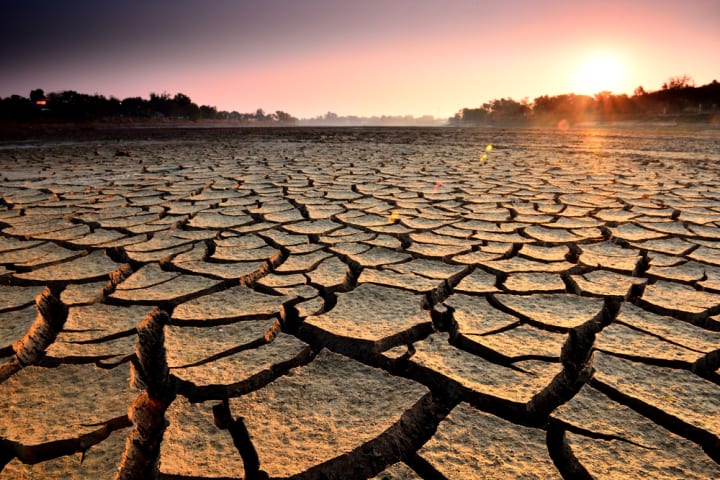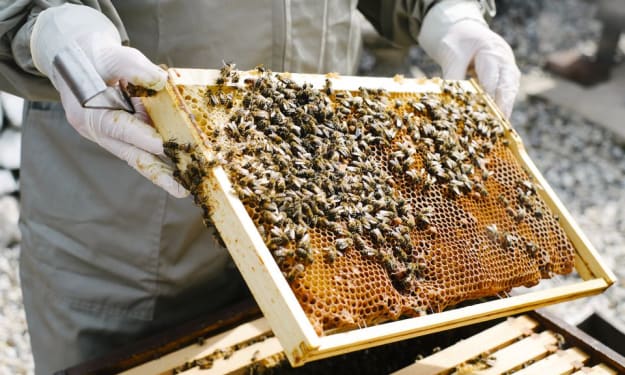We're Having A Heatwave!
Tips For Surviving Extreme Heat

As the Earth’s climate warms up, heatwaves have become more frequent and intense over the last twenty years. The extremely high temperatures associated with heatwaves claim 1,300 people a year. High humidity often accompanies them, making this weather phenomenon harder on the body. Though there is no exact science yet on how to predict a heatwave approaching, for now, we define them as a period of unusually high (over 90 degrees F.) temperatures that last for over two days. Many have lasted for weeks, and sometimes even months. To determine if a heatwave is happening, the National Weather Service uses the Heat Index Values. This is what the temperature feels like to the human body when relative humidity combines with the air temperature. Heatwaves can cause many other natural hazards, like droughts and crop failures. Here are some helpful tips for the next time your town becomes an oven.
Working In The Heat

For many people, hiding from the heat is not an option. If possible, try to reason with management to perform outdoor-related tasks earlier or later in the day when the temperature is cooler. If this isn’t possible, then wear loose, lightweight, light-colored clothing and a wide-brim hat. Apply sunscreen with an SPF of 30 every four hours to keep from getting sunburned. Take frequent breaks to cool off. Sip water as often as you can to stay hydrated. Pace yourself to not cause heat-related stress on your heart, causing a heart attack or stroke. If you or one of your co-workers is showing signs of heat exhaustion or stroke, then follow the proper steps to ensure they get adequate first aid. Never take salt tablets as a way of beating the heat, as this will only increase your chance of heat-related illnesses.
Heat-Related Illnesses

Heatwaves are the leading cause of death among all the natural disasters. Prolonged exposure to extreme heat can cause cramps, swelling, and fainting. Sunburns affect 1 in 3 Americans and can lead to skin cancer, or melanoma. The two biggest killers during a heatwave are Heat Exhaustion and Heat Stroke. Heat Exhaustion is when you become dizzy, thirsty, and weak while out in high-temperature zones. Often the first sign is heat cramps, which are painful cramps or muscle spasms in the legs and abdomen. To treat it, you must move the person to a cool spot. Loosen any tight clothing articles and have them remove their jewelry. Take sips of cool, not cold, water. If left untreated, Heat Exhaustion turns into Heat Stroke. Heat Stroke will have similar symptoms to Heat Exhaustion. The only difference is a person suffering from a Heat Stroke is more confused, and sometimes unconscious. To treat someone having a Heat Stroke, follow the same steps as you would for Heat Exhaustion. However, if the person is unconscious, you can’t give them water. Place cool rags on their head, neck, and armpits instead while you wait for emergency services to arrive.
Dehydration

Dehydration is when the normal water content of your body is reduced enough that it upsets everyday bodily functions. Water makes up two-thirds of the body, so it needs it to maintain day-to-day operations. It can affect anyone, but it seems to target young children and the elderly the most. In almost all cases, dehydration can be treated at home. The fastest way to cure it is by drinking an oral rehydration solution, such as Pedialyte. If unavailable, you can make your own by mixing 6 teaspoons of sugar and 1 teaspoon of salt into 4 cups, or a quart, of plain spring, tap, or drinking water. You’ll want to use lukewarm or cool water as your body’s cells absorb these faster, speeding up the healing process. You can use an electrolyte-based drink, like Gatorade, in place of water if you choose to. Fruit juices and clear broths are also good substitutions. Avoid coffee, tea, soda pop, and alcohol, as these beverage choices will exacerbate your dehydration. Rest in a cool area and take small sips every 30 minutes until feeling better. If experiencing severe diarrhea, vomiting that lasts longer than 24 hours, severe chest pains, or lack of urine output, you’ll want to head to your local emergency room at this point.
Droughts

It’s not just your body’s water the heatwave is evaporating, it’s also Mother Nature’s water. A drought is a prolonged period of abnormally low rainfall, leading to a water shortage. If you live in an area prone to heatwaves like California, you should already have a drought plan in place along with drought survival supplies like bottled water, disposable plates, and cutlery, waterless hygiene products, etc. Bandannas or some sort of face covering, with protective eyewear is good if dust clouds are an issue. Millions of acres of farmland can dry out in a heatwave, leading to food shortages in the next few months. Make sure your food pantry is up to date to stay ahead of them. Ration water use at home by reusing your dish and laundry water. Flush only when necessary. Take shorter showers or only fill the tub halfway. Use mulch around trees and plants to help them keep moisture better in the heat. Refrain from watering your lawn. Use a commercial car wash that recycles its water. When not in use, cover your pools and spas.
Blackouts And Brownouts

Blackouts and brownouts are another common event that occurs during heatwaves. Everyone is staying indoors with their AC units and fans running on full blast with the searing heat outside. When these two things mix for too long, the grid becomes burned out from overuse, causing it to shut down for its own safety. This leads to a blackout. If lucky enough to catch it in time, communities will often shut the main power off during peak hours to prevent a blackout from happening, and to save the power grid from destruction. This is called a brownout. Whether you are in a blackout or brownout, staying cool should be a major priority. Emergency facilities that have backup generators will set up cooling stations for those in need of it. Keep your fridge and freezer closed as long as you can to prevent food spoilage. Close all curtains and doors, blocking out as much sun as possible. If you choose to go outside, wait until peak heat (10 AM-4 PM) is over, or hang out in a shaded area during those times. Never ration water, as this leads to dehydration. Always stay as hydrated as best as you can. Eat small, light meals throughout the day instead of large, heavy meals. This is because your body generates heat to digest food. So the bigger the meal, the more heat your body produces. Place a damp cloth on your forehead or neck to cool the body off better.
About the Creator
M.L. Lewis
Welcome to my little slice of pie. This blog will primarily focus on prepping and homesteading skills with a sprinkle of fiction every now and then.






Comments
There are no comments for this story
Be the first to respond and start the conversation.